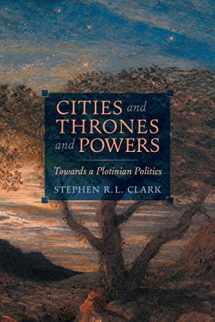
Cities and Thrones and Powers: Towards a Plotinian Politics
Book details
Summary
Description
What would a “reappeared” Plotinus answer today if asked how we might build a divinely-ordered city? That is the question at the core of this unique book, and Stephen Clark takes us on a wide-ranging deep dive to uncover possible answers. To do so, he first gives an account of the Plotinian philosophy of mind and metaphysics, showing how Plotinus nicely balances the entanglement of soul-body composites (our immediate identities) with the workings of the World Soul and the eternal soul that animates “from within.” Drawing on later Christian and Islamic interpretations of the Neoplatonic tradition, and parallel developments in Hindu thought, he then describes the various social forms that seem to be the inevitable context of our lives here and now. Furthermore, we discover that the form a Plotinian religion adopts depends on taking seriously the thought of reincarnating souls and wandering hermits, but now with the difference in our time that, although some sages may be content to consider themselves simple wanderers in a world without borders or settled communities, some will follow the same path as Buddhists, Epicureans, and Christians: forming communities of friends loyal to their founder and to the fellowship of the Sangha. We learn as well that in due course even those among the hermits who prefer to go, almost literally, “alone to the Alone” will become part of dispersed, unhierarchical communities. Finally, Clark offers cautious thoughts about our likely futures, dependent both on current technological advances and on the realistic suspicion (shared by our predecessors) that catastrophes and wholly unexpected turns are always to be expected.
From the Back Cover
"In recent years, Stephen R. L. Clark has done more than any scholar before him—at least, any of whom I am aware—to rescue Plotinus from the casual but persistent misrepresentations to which he has been subjected down the centuries (usually for tendentious reasons, utterly unrelated to the actual texts of the Enneads). This book brilliantly demonstrates that Plotinus's thought is profoundly social, cultural, and political (and benignly so) not only in its implications, but in its direct intentions. For this alone, we owe Clark a great debt of gratitude. But the pleasure of this book goes beyond that afforded by the mere rectification of an injustice; it lies also in the experience of reading a writer who is also a great and exquisitely original philosopher in his own right engaging with a thinker with whose thought he enjoys a particular and profound sympathy."—DAVID BENTLEY HART, author of Kenogaia (A Gnostic Tale) and Roland in Moonlight
"Seeking to call into question modernity's smugly embraced verities, Stephen Clark draws on his exceptional understanding of Plotinus's own work and his own provocative insights into political philosophy to bring Neoplatonic thought into conversation with contemporary concerns while helping unsettle our instinctive responses to those concerns, employing logical argument and allusive, evocative reflection. As always elegant, graceful, and learned, Clark is alert to the pronounced differences between earlier epochs and our own even while turning a skeptical eye on the temporal chauvinism that treats our own ways of seeing, judging, feeling, and acting as self-evidently superior. Linking politics with metaphysics, history, literature, and religion, this book will rightly engage the attention of historians, classicists, and political theorists along with others intent on fruitfully exploring the nature and destiny of what Clark calls 'Lifekind.'"—GARY CHARTIER, Distinguished Professor of Law and Business Ethics, La Sierra University
"This wide-ranging, brilliant book by the leading expert on Mediterranean thought in antiquity is highly relevant to our own today. Clark has done ground-breaking work on Plotinus's philosophy of politics, values, culture, and the divine. This should be of interest not just to


We would LOVE it if you could help us and other readers by reviewing the book
Book review



